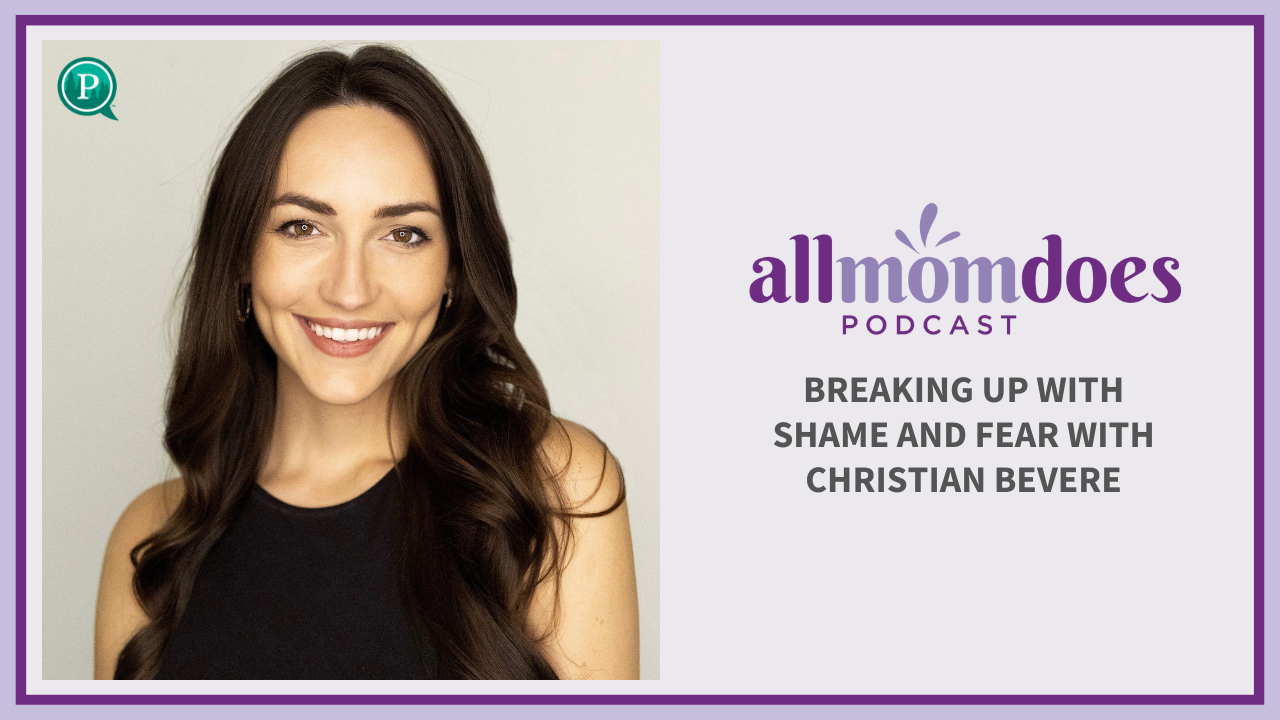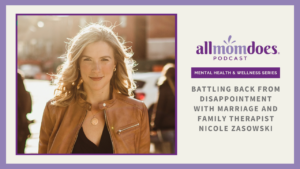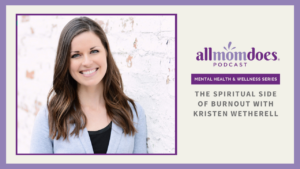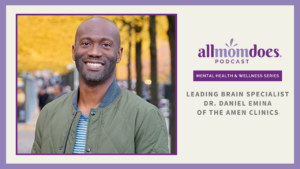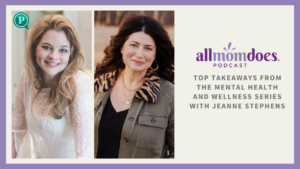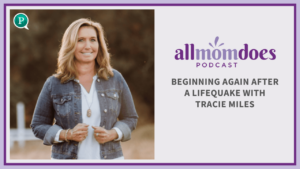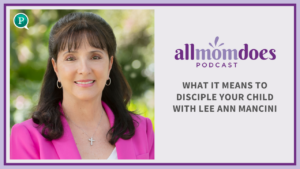Why do we continue to keep shame and fear around, when we know that it’s not doing us any good? Christian Bevere joins The AllMomDoes Podcast host Julie Lyles Carr for a look at why we continue to focus on former issues and allow them to condemn us in our today, and how we can ‘break up’ with the past.
Show Notes:
Find Christian: Online | Instagram | Facebook | YouTube
Find Julie: Online | Instagram | Facebook | Twitter | Pinterest
AllMomDoes | Instagram | Facebook | Twitter
Transcription:
Julie Lyles Carr:
Today on the AllMomDoes podcast, I’m your host, Julie Lyles Carr. I have someone on. This is really fun. I’ve had a few experiences where we’ve had sort of a multi-generational moment. I’ve had mothers in-laws and daughters in-laws on together, but I think this may mark the first time where I’ve had mom-in-law on before and now I’m having daughter-in-law, and we’ll see what kind of juicy goss we can get out of this situation.
Christian Bevere:
No promises. No promises.
Julie Lyles Carr:
Okay, well listen, you’re in for a treat. This is Christian Bevere. She is going to talk to us about things that I feel like are very much at the heartbeat of a lot of today’s women. But before we jump into our topic, Christian, why don’t you tell a listener where you live, things about your life, and who is that mother-in-law that you’re related to?
Christian Bevere:
Well, Julie, thank you so much for having me on and prefacing with the fact that I come from an amazing family. I think that’s one thing to know about me is I’m Christian Bevere, the mother-in-law referred to is Lisa Bevere, the Sicilian G Mama to many of us. She’s incredible, but I think she has an even more incredible son that is who I married and he’s been my husband for going on five years. And we are newish parents to our little son, Azariah Jacks. I was thinking about it earlier. I was like, when do you get out of the new parents stage to the air quote established parent? It’s almost like newlyweds, right? That first year you just have the grace of, oh, they’re new to it. They’re learning.
Julie Lyles Carr:
Yeah. Yeah. I hope that we always have that grace because here’s the thing, Christian, every new stage, I don’t mean this in a discouraging way, I mean it in a graceful way that maybe has a sidebar of discouraging, but it is like you’re new. You haven’t had a two-year old before, you haven’t had a 10-year old before. You haven’t had an 18-year old before. Maybe it’s kind of like the Phoenix, or maybe it’s something like an ever lasting stream where you’re just always kind of fresh and new into this space. So that’s why we got to have breeze with each other, but I love his name. That is beautiful.
Christian Bevere:
Thank you. Yeah, it’s something we, or I feel like I received probably two years before we even started trying, and then when we had a son, it just felt so aligned and Azariah means God helps, and Jax means God is gracious. And we’ve just seen that as a banner over his life already in the shorts of my long 10 months, and it’s just a joy. Being a mom is the most proud thing I’ve ever been. And there was a point in time when I was so career focused that I didn’t know if it would be or I’d be so ready just to have my kids and love on them, but do all the other things, but he trumps it all. It’s really special.
Julie Lyles Carr:
That’s beautiful. That’s beautiful. Now, as we mentioned, you have a unique experience because you married into a family that was very well known within the faith space. We talk about pastor’s kids and because I pastored for a while, my kids have definitely had that phenomenon where everybody’s looking at you paying attention to how the pastor’s kid is acting and there are some expectations and some things that can come with that, some pressure that can come with that. How is it for you marrying into this family and realizing that there were going to be aspects of your marriage, of your early parenting journey, of your relationship with your in-laws that might be under more of a microscope than what would be the norm maybe for a regular, I’m using air quotes, daughter-in-law to come into a family. What has that experience been like?
Christian Bevere:
Yeah, I’ll say frankly, it’s a large family, like you said, largely known but also large in quantity of the amount of people. And so the interesting dynamic of throwing a lot of different things into the pot and mixing them is you’ll inevitably have some bubbles arise, some tension. And I’m very thankful that this family already, but increasingly as the more people come into the fold realize that we fight for fierce unity, that’s one of the banners we put over our lives and ministry is we need to be fierce and understanding each other, fierce in loving, fierce in conflict. And so that has helped so many things where it could feel interesting.
I left Alabama where I was born and raised for 23 years and moved to Colorado when we were first married and felt like I almost picked up my life and jumped right into his being around a lot of family members being in the state that he grew up in. And so there were some interesting dynamics that are true to every husband and wife getting to know each other in those early years, but very unique to us. And I’m thankful that not only my husband was up for the challenge of doing that well, so we both felt like we had a piece of the puzzle almost. But even my in-laws and siblings being open to journeying that as well.
Part of the faith dynamic of people looking in on that and having the presumptions is I tend to go deep. And so surface level to me is just not very authentic or true or honestly helpful. So in those questions, I’ve met people and we’ve gone to different states or even different countries and have that question of what’s it like to be a Bevere or my favorite one, how did you land a great guy because there’s no great guys left and they expect the, well, I was miss so-and-so and I did this right and here’s my track record. But I could honestly tell them, Hey, it’s not because I did everything right. It’s because I just feel like God has aligned us and he’s done a healing journey in me. He’s done a healing journey in my husband, though he comes from a great background though he’s a great guy. What rings true is God leads us.
He is the foundation of every marriage, of every relationship, and if we allow him, He will do exceedingly, abundantly more in us and in us as couples. And so that’s what I’m really grateful to be able to share. And even more so in this book from a personal level, but just knowing that we all have that reliance on Christ as individuals and as couples, and especially as moms, like you’re saying, we need that fresh grace daily.
Julie Lyles Carr:
So you had this experience of getting married and moving away from Alabama. Now where in Alabama were you originally from?
Christian Bevere:
We are right around the Gulf Shores, Fairhope area, if you’ve heard of either.
Julie Lyles Carr:
Well, my dad was raised in Pascagoula, Mississippi, so just right up the road.
Christian Bevere:
Okay.
Julie Lyles Carr:
Yeah, and I was born in Huntsville, Alabama, so up north.
Christian Bevere:
Okay.
Julie Lyles Carr:
So yeah. That was-
Christian Bevere:
[inaudible] Southern.
Julie Lyles Carr:
Yeah, that was home turf when I was little. That’s right before we moved out to California. That was home turf. But I had a similar experience in that I got married, my husband and I met in college in Texas, and then we went back to his hometown and my family didn’t live around us and I was immersed very much into my in-law family, in a new town, in a new way. It was something that was starting over in a sense. And yet with these foundational pieces of a family who had lived in this area for a long time. You’ve now been through that, but now you’ve moved back kind of closer to home, maybe a little bit easier access to some of the places that are more familiar. What has that felt like to go and start a new life away and some of the sacrifices that are made in that way and also some of the ability to start over, but then coming back into a situation, in a region of the country, places where maybe you have some previous memories, what has that been like?
Christian Bevere:
Yeah, it’s really twofold for me, and this is something that I’m very passionate about and share at length in the book, but the idea of shame and almost the unweaving that has to take place. For me, I’m very thankful. I feel like God took me to college, still close to home, but a new town of sorts. And then I went back home and I had this almost allowance to see things clearly of going back a little bit more mature things that I wanted to do better, things that I wanted to conquer or I wanted to no longer be a part of my life and heal from, and then marrying someone in a different state. I did have that allowance like you’re saying, to start new and have a fresh outlook, not have people or even reminders of, well, you can’t do this. You’re not allowed to heal. You’re not allowed to be a good wife, married to an incredible man. I felt an allowance to do that.
It did come with some of the interesting nuances, as I’m sure you’re familiar with, of just where do I fit into this family that’s established, that’s wonderful. You don’t want to break any of those sides, but I just want to finagle in there and have my piece where I’m a part of this because I’m so proud of it.
And then moving back home, the twofold section comes in of I was so happy to think I can raise my child going to the beach like I did growing up. I can be closer to my family. But then I also had to tackle and really challenge myself. Do I still carry the weight of I am a mom, I am a righteous wife, what I’ve established here, I can bring back to old territory even if I felt less than here, I can come back in a renewed sense and really walk in redemption. And it wasn’t easy, Julie, it was sort of hard, but I’m really thankful for some of the ways that God healed me and he showed me how to have that more than a conquer mindset, not just as something I slap over myself, but really he walked with me and whispers continually to let me show up to new places or old places, new friends or old friends as the person and the woman and the mom and wife he’s created me to be.
Julie Lyles Carr:
That’s beautiful. We really want to delve deep into this idea of what shame does in our lives. And to some degree, I almost feel like in having spent a long 10-year in women’s ministry, we’ve lost the thread of what we’re talking about with shame. And I’ve seen two perspectives. I’m not saying there aren’t more layers and shades within it, but I would encounter women, and this is going to sound a little strange, but sometimes when we feel shame over something that could be conviction, that there is something that we’ve done that we need to get free from, we need forgiveness for, we need to engage in repentance. And I would watch people say, oh, no, no, I’m feeling a sense of shame. I’m going to ignore that because under God’s grace that should have no place in my life that is a sensation or an emotion from the enemy.
That would be one place and in my own life and in others, there would be that moment where I’d be like, maybe that’s a tool. Maybe that is something we need to feel a little bit of. On the other hand, I would see people who the shame became their identity. The thing that they had done became their central story. They wouldn’t be able to simply share that God had done a great thing and had delivered them. They would need to really get into all the nitty gritty of their past behavior, their past life. So as you approach this project in this new book that you have, how did you approach both defining shame and figuring out and helping people understand the difference between what I’m going to call kind of simplistically good shame and bad shame and what we do with that and where are the lines where we’re crossing into either ignoring the signal it’s supposed to be or we are, boy, are we embracing it and snuggling it right up to us, so much so that it leeches into who we are. How do you dissect all of that?
Christian Bevere:
Yeah, I’m glad that you’re prefacing that this is a multifaceted topic and to be honest, as I’ve gone through it recently in getting ready for the release, I was almost saddened that I couldn’t go deeper. But I really feel like this book is a guide of sorts and an introduction to this healing journey. There’s tons of things where we can go really deeper and I urge people to do that relationally with God and let him really direct you. I’m just here to be a peer guide, a guide to you or your daughter for whoever’s listening. But in my journey with shame, it was to me, one of the chapters I want to talk about the most because it had the biggest impact and I didn’t realize prior to writing how much it affected all the other areas I talk about, which is not feeling enough, having regret, comparison, really understanding my relationship and worth with Christ.
Shame was the gateway drug for me, and I like to kind of liken shame and conviction that they’re not feelings, but more so directions. So let’s say that there’s something that happens to you. You can almost take it into two different lenses. Are we going to let it be conviction, which leads us to repentance, essentially just turning around and rewriting our course to get back to direction with God on that path he’s created, or do we let it be shame, which is a manipulation that the enemy uses to take what’s meant to be a redirection and cast us on a different path that we were never intended to go on.
For me, I’ve seen that shame takes on the layer of you’ve done this thing now you need to be hidden. You cannot talk about it almost what you’re alluding to, right? This isolation factor where the negativity can infest and grow into something sinister, and we almost don’t know how to weed our way out of that.
And so for me, I really want to talk about this. So one, we can choose the direction of conviction. Both of them can feel like we’re pointing fingers at what you’ve done, but how do we take that lens? And I think that is based on how we see our father. Because if we see him as an accuser, someone that wants to point out our mistakes, and this widely can come from your relationship with your earthly parents, relationships with your spouse or even past boyfriends or friends, but how are you hearing the voice of God? I think we need to be in tune with that and know that God is someone that points out things so that we can become our best. He created us intimately, fearfully, and wonderfully the word says. So if he knows us intimately and fearfully I think, is knowing the fear of the Lord. And Psalm 19 says, the fear of the Lord is clean, enduring forever.
So seeing this is a lens of if we have sin in our life, let Him be the cleansing. That fearfulness of knowing, man, I messed up. I need to run to my father. I think there’s a sermon or a meme going around. It’s like, I don’t want to go to my father and think, oh no, I can’t tell him because I messed up. No, I want to go to my father and say, I messed up. I need you. So anyone experiencing shame and there’s so much more, I can go on and on, but what I really want to walk away from that question is anyone experiencing shame know that this is a chance to run to God and process that with him. You will feel so much cleaner, so much freer, so much truer back to getting that out of your life than if you suppress it and think, I can’t go to God. I’m too dirty, I’m too wicked. No, he already knows first of all, and he’s readily there with his hands extended wanting to care and guide you through that.
Julie Lyles Carr:
I love the title of your new book, Breakup With What Broke You, and part of what I love in that title is it gives this imagery that I think is very powerful. Maybe a lot of us have been through dating someone who we knew was bad news for us, and yet the willpower to break up with that person when there were such connections or soul ties or what you thought the possibility was, or if you had only done this, if you could only fix it in this way, then maybe that would make the relationship worth staying in.
I love this sort of imagery of having this relationship, this dance with shame that oftentimes we can get addicted to almost like a form of sugar. It is just something that for some reason can make us feel like this is the only governor for us understanding where the lines of righteousness lie, where the lines of grace are, all of these things. So talk to me about that relationship that you see when people in a sense want to stay connected to these feelings that can be condemnation, that can be regret, that can be shame, that can be all of these different things. Why do we sometimes want to hang on to those more tightly than the freedom that we could have? What is the bad boyfriend list that is going on with those kinds of emotions for us?
Christian Bevere:
Yes. I’m so glad you love the title. It spoke to me too because I think we all can relate. I mean, I want to relate to the woman that’s feeling this because I’ve been there on both sides. I’ve dated the guy that I knew I shouldn’t. I’ve told myself, well, there’s potential and we can change. And I think that rings true in our journey with shame as well. I often think we never set out to be the girl that messed up. We never set out to be the girl at the party looking for attention. We never set out to date the bad guy or to be wrapped up in shame, but how do we get there? And I think if we can answer that question, we can know why am I leaning onto this? Why am I hanging on to this image of me?
I’ve often felt like God speaks to me in dreams and I’ve just been processing and thinking, how can I still even further relate to someone in this area? And I’ve had dreams that really line up with, I believe it’s John 3:20 through 21, and it talks about how the wicked hate the light because, and I’m prefacing here, so people go and read it for yourself, but the wicked hate the light because it feels exposing, but those that go to the light feel cleansed because they know that it is God that works, the good works in them.
And I think this rings true. You’re asking why do we hold onto these areas? Why do we stay in the bad relationship? Why do we keep letting shame speak to us? Because we think if the light touches, if all this stuff comes to the surface, someone’s going to be there pointing a finger at us, maybe multiple people, maybe it’s our parents, our friends, it’s God himself, and we don’t want to feel exposed.
But what I love in breaking down this verse as I do in the book is the word for wicked in Hebrew is [foreign language]. And I thought that meant exactly what I felt like dirty, unlovable, unusable, less than, but what it really means is guilty. And not guilty in the sense of you’ve done something so wrong, you’re excommunicated, but guilty in the sense of we’re prisoners to shame because we’re allowing ourselves to stay behind bars and close to its tactics when Jesus is readily standing there, I have the key, we can get you out of this. You’re not sentenced to this X amount of time. Often we think, well, I initiated this bad relationship so I got to stay in it. Maybe I got to fix it myself. One, we do not have that much control. And two, how many of our bad relationships ever actually turn into the best relationship it should be. It doesn’t work that way. We have to break up with the shameful habits, the tendencies, maybe the bad friendships that are creating this cycle and believe that there is hope on the other side.
But it takes that breakup, it takes the wanting to change. And what I think often I’ve seen with my generation is we’re so scared to do that, that we take that on as our identity. Okay, I’ve for examples here, I’ve slept around and I’ve done this and I don’t feel like I’m adequate to go back to the vision I once had for my purity or my marriage so instead of dealing with this because it’s too painful, I’m just going to take it on. This is going to be who I am.
And I’ve had conversations with certain women that say, I’ve been in that category and it just feels impossible to get back. So I’ve tried to make it work and I’ve tried to make it work, and they just hit a breaking point where it all comes flooding out. And I think if we have the ability to be honest and raw with ourselves and hopefully with some others, maybe there’s some great community or pastoral leadership. I know you said that you’ve done that in women’s ministry, that is invaluable to have those women in your life that’ll call things out as a goal within you and remind you of your worth, especially when it comes to shame. So we can get out of that cycle.
Julie Lyles Carr:
That’s beautiful. Christian, I noticed in my tenure, shame would have a root that came, again, there are lots of layers here, but from a couple different places that were interesting. One would be from sinful choices, things that we chose to do that we knew were contrary to the life that we agreed to when we became Jesus’. That would be one side. The other side would be a series of things that really had nothing to do necessarily with God, with his best for us, with his advice and wisdom for us. It had a whole lot to do with what we thought we needed to be within the culture.
Now, when I say within the culture, we can talk about culture, meaning the world and all of those kinds of things, whatever you want to call that, the partying, the lack of more, whatever. But I often saw that a lot of this came from what I’m going to call within the culture of the faith community, different expectations and things that people felt like they had to be messaging they’d received through the years, things of that nature.
You talk extensively in your new book about this place where comparison does this kind of stuff to us. Where feeling like we’re not enough does this kind of stuff to us, and none of that is based on choices we’ve made which have been outside of God’s best for us. A lot of that has to do with the messaging we are taking on and who we think we’re supposed to be as women, wives, moms, daughters, all the things.
How can someone do a better job of understanding where the root of their shame is coming from? Because as we talked about at the beginning of the conversation, there are places where shame can be a great tool to remind us you are not living in God’s best for you. These choices you’re making are not going to lead to the kind of life you want. And then there is that root to shame that has a whole lot to do with our inner dialogue and looking externally at everyone else thinking we have to be something that we’re not. How can we do a good job of understanding which kind of root, which etymology we’re dealing with when it comes to the shame game?
Christian Bevere:
There’s a theory around the body keeps the score and how your body actually will process the trauma, emotional, physical, whatever it may be that you’ve held onto. And what I like to tell people if they’re navigating shame, regret, comparison, and they’re not really sure where to look first is do a little challenge with yourself. Look in the mirror, say, I am qualified. I am beautiful. I am this and that. Words and promises that God has laced over you. And if there’s anywhere your tension arises, you feel like, oh, I’m not believing that I’m saying it. It feels off. Start with diving there. Maybe you’re saying I’m lovable, but your whole body is tensing up and your fists are tight. Why is that an issue? Why do you feel unlovable? Like you’re saying, there’s so many different factors that can come from external internal, childhood, present day.
And what I saw for myself is I knew some of the instances that were leading to my choices that were leading to comparison. I couldn’t readily point a finger on them, but if I would’ve taken the time to journey there with the allowance to dive deeper, I believe it would’ve saved me some of the moments that I share in the book. But praise God, we’re here with the redemption to share that as now a testimony.
But I would encourage anyone if they’re feeling tension in their friendships where maybe comparison just often comes up, it’s hard as a third party to really speak to why that’s happening. But I feel like everyone listening has the power and the tools. Like the word says that God gives us the tools we need to live this life well, you have the tools to journey them out.
Now, like you’re saying, the different cultures we experience don’t always point to or show how to do that well. But what I believe and why I’m actually thankful that this book is a little bit more all encompassing and elementary of a healing journey is because I think once we open ourselves up to that and we say, God, will you step into this area? Will you show me how to heal? Taking the King David approach of search my heart? You show me, you cleanse me, you pinpoint, He has full allowance to journey and He’s fully capable to heal us.
Now, practical steps, I would say to anyone that has been in this cycle of comparison, let’s go there. What are the quality of your relationships? How is your interaction with the word? What are you actually allowing to not just go to your head but also to your heart and who is speaking into you in an intimate way? I remember the most conviction I felt, and the first step of shaping a healing journey was when I had friends around me that knew the word, they weren’t looking to compete with me. We were in similar but different circles. We weren’t putting all our eggs in the same basket and trying to compare and contrast.
But when you have that level of friendship, whether you’re a 40-year-old woman or a 14-year-old, it shapes how you hear yourself. And I think we’re the combination of what we let into our lives and who’s speaking into it. So if we are constantly hearing gossip, if we’re hearing friends that are comparing, if we’re hearing other moms that are talking about, well, my daughter does this, and it has that tone that you can just pick up on, let’s change our radio frequency. There’s a study that I share in the book and it talks about what we hear the most is what our ears begin to become attuned to and what your ears get used to listening to your heart listens to. So our heart’s going to be the equation of what we are filling it with. And so if we’re only hearing comparison, if we’re only hearing regret, it’s going to begin to cycle and manifest in how we live our lives. So that’s my practical advice for getting out of that cycle. Go ahead and get out of it and let that show how it heals and how you live your life.
Julie Lyles Carr:
It’s really powerful because so often we can end up in a cycle with friendships, with family, all the rest where the narrative becomes that. And we often sometimes from a place of feeling like we need to love everybody and be friends with everybody, we don’t know how to do an audit, to make sure that what we’re allowing to come into our lives is the things that are supportive and helpful with wherever we might have a weakness and a challenge and a temptation. And so often attracts like if we are struggling with comparison, if we’re struggling with a negative inner voice, we may surround ourselves with people who are doing the same thing because it feels so familiar. So your very practical and wonderful advice to say, wait a minute, who am I allowing to have my ear the most can be a really powerful thing to help break up with what’s breaking you.
Now, I wanted to ask you this. A lot of times when we think about the truth of God’s word and the truth of who we are in Him and the lies of the enemy dragging us away from that, what we can miss is that place where sometimes there’s a half-truth embedded in some of the things that we’re hearing. When I think about Jesus being tempted when he comes to the end of fasting for 40 days in the wilderness and it says that the enemy takes him up and shows him all these things, the enemy speaks directly from scripture in some places and Jesus has to refute, not scripture, but refute the way that it could be coming at him because of the temptation that is being put before him.
Where are places that we are in danger of experiencing half-truths where it can sound like something maybe we should take on or we should feel bad about or we should deal with or about our own identity, and yet it’s not something that encapsulates the entirety of what God intends and means for us. How do we find those? How do we parse those out?
Christian Bevere:
I think we’re vulnerable in any area that we’re not armed and we can know the word, but if we do not know the creator’s heart, then we run the risk of taking a half-truth as a whole truth or a partial lie as a little white lie, as you’re saying, the enemy came to God disguised as good. I think for women especially any area that is of good intent and innate to nature, the enemy wants to twist.
Now, we’re seeing this widely in our society right now of anything that is a desire to care for your children, to honor and respect your husband is seen as weak. It’s being posed as well you should be a go-getter. And I know that there’s women listening of all different backgrounds, career-drive, stay-at-home moms, single women, and that is wonderful. But the heart nature of being a woman, and I think what we are actually equipped to do is to love others well. I mean there’s a reason that the imagery of Christ coming back is for a bride, this dynamic of husband and wife and female strength and male strength.
What we don’t want to do is get away from what God has called us to be. And I think that’s often what we’ll be tempted of is not you’re a horrible woman, but it’s well, how can we taint womanhood? How can we show it as not being beautiful and by design and how can we just expose it as something it’s not? What breaks my heart sometimes is when I hear relational advice that has become misconstrued is it’s oftentimes the way women are represented is, well, women aren’t allowed to preach or women aren’t allowed to do this. How much of that is just seen as, well, you cannot do this, but a woman can pastor a friend. You can encourage someone else. You can have faith and grace in these aspects that we really should lean into.
In the book specifically, I talk about, I think there are different half-truths and half lies that we need to be aware of. Two camps of that can be you are lies and you are not. The ones I personally dealt with is you are not lovable, you are not enough. You are in control when I really should be letting God control. So there are so many different factors this can journey into. But again, just getting back to the premise of that is anywhere that we don’t know God’s design for our life, we don’t have personal promises that he has given. Us taking the word at its word, He is good, His yoke is easy, His journey is light. Motherhood, merit, identity. These are multifaceted things, but they shouldn’t be hard.
So if we’re coming up against an area that just feels like, well, we’re not qualified for this or we’re not equipped, or I feel pulled in different directions of people saying how I should lean into this or who I should be, what does God say? What is His firm foundation that is evergreen never changing? And then once we know that we can listen to advice and we’re not going to be swayed by, well, maybe it’s this, maybe it’s that. What does God say? It feels cliche, but it’s the most true we can get to the expression of knowing who we are and what to allow into our lives.
Julie Lyles Carr:
The book is called Breakup with What Broke You, how God Redesigns and Rewrites Your Story. Christian Bevere, so great to have you on the show today. Tell listeners where they can go to find out more about you and about the book, all the things.
Christian Bevere:
Absolutely privilege to be with you today, Julie. The book comes out August 15th and you can get it wherever books are sold. Of course that means Amazon and your local bookstores, but also Booker Bakehouse is having a, I believe, 40% off sale and we love a good sale around here.
Julie Lyles Carr:
Of course we do.
Christian Bevere:
So I don’t want people to miss that link.
Julie Lyles Carr:
Alrighty, I’ll have Rebecca get those into the show notes. So listener, you can go and find out more about all that Christian is doing and all the great stuff that she has to say. Be sure and check out allmomdoes.com because that is a place where you’ll find a community of other women just like you all in the trenches with the kids and the marriage and the career and their spiritual lives. I love to connect with you too. I’m Julie Lyles Carr, all the places I particularly hang out on Instagram and be sure and share this episode with a friend. Share it with someone who you know has been grappling with shame, trying to figure out a better way, not sure how to break up with some of these emotions and these drives that are not serving them well. Be sure and share the link because that really is one of the best thank yous you can give us and I’ll see you next time on The AllMomDoes Podcast.
Follow this podcast:

